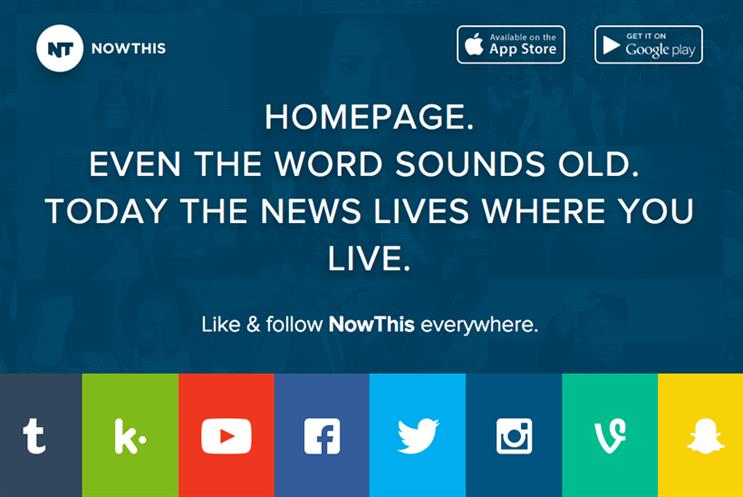If you click on a link to a news website called , you will see something extraordinary.
The homepage contains just these words: "Homepage. Even the word sounds old. Today the news lives where you live."
The site promises that you can "like and follow NowThis everywhere".
According to Francesco Marconi in an this week, NowThis is a leading example of a brave new kind of media called "homeless media", and we should all consider copying it.
New services including Facebook’s Instant Articles or Snapchat’s Discover mean content can now be hosted and monetised on third-party social media platforms, without the need for users to ever click through.
The appropriately-titled 'homeless media' is, in fact, a terrific way for media companies to turn themselves into little more than content sweatshops for their social-media overlords.
So while current media creators are posting content on social-media platforms in the hope that users will click back to their site, where their eyeballs can somehow be monetised, a new wave of 'homeless' media companies, such as NowThis, are emerging that don’t require a home page; their sole purpose is to syndicate content.
On the face of it, this makes sense. Media companies need to go where the audience is, and social media’s audience is vast. And people don’t really want to click out of the social-media app they are using in their smartphone. That’s why The Washington Post recently announced it so all its content could be immediately accessible to users of the social network, with no loading time or paywalls to work through. CNN has a dedicated team of one designer and two editors focused on . Twitter wants to work with partners on its feature, which presents a curated section of tweets related to a particular topic.
But there is a problem with this new model. It’s commercial suicide for established media brands.
Controlling interest
It is a truth universally acknowledged that whoever is closest to the customer controls the business. That’s why, for example, retail banks are terrified of Apple. They fear the tech company will use its iPhone-driven Apple Pay service to wedge itself between the banks and their smartphone-wielding customers, effectively relegating the banks to a kind of back-room financial utility company.
By building audiences on platforms they don’t control, media companies could find themselves falling into a similar trap. The appropriately-titled 'homeless media' is, in fact, a terrific way for media companies to turn themselves into little more than content sweatshops for their social-media overlords.
Rewriting the rules
Think about it. All social-media platforms curate content based on users' past behaviour, to make sure their users' news streams don’t get clogged up with stories or ads they don’t want to see (or haven’t wanted to see it in the past). On Facebook they call this EdgeRank, and it controls everything we view on the platform.
So it’s Facebook that makes – and changes – the rules which decide what gets seen on their platform and what does not. If you are a media company publishing content on Facebook, that means Facebook has got between you and your audience. It controls the business, not you.
Surley no one would be foolish enough to give up control of their audience in this way?
Buzzfeed is a hugely successful media company, but the majority of its connections to its audience are on social-media platforms it doesn’t control. Facebook has its thumb on Buzzfeed’s windpipe.
Buzzfeed’s solution? What it really wants its audience to do right now is sign up to an email subscription service. That’s a smartphone-friendly media platform Buzzfeed can actually control.
Otherwise, the title 'homeless media' might apply in more ways than one.


